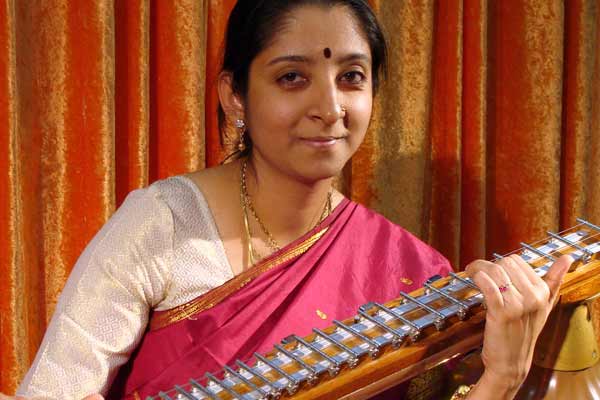Indian vocalist Rajyashree Josyer Shrikanth will take you on a trip to the divine when she presents 'Unity In Diversity' at the Queensland Multicultural Centre (BEMAC) in August.
Part of BEMAC's Singout Sista series, which showcases the incredible talent of women in world music, 'Unity In Diversity' is an evening dedicated to the devotional music of India.
Rajyashree is a premier exponent of the Carnatic vocal system from southern India, one of two main sub-genres of Indian classical music evolved from the Hindu tradition. She is also a vocal coach and a masterful veena (a stringed instrument from South India) player, often referred to as a vainika.
How are you feeling in the lead-up to 'Unity In Diversity'?
[Rajyashree] It's a great privilege to be an ambassador for Indian music and I feel thrilled to be able to present it again to a wider/ Western audience.
What can audiences expect from your performance?
A presentation of compositions of great masters in different styles, moods and languages across India.
Will this be a 'get up and dance' show or more contemplative?
Contemplative. The compositions will range from deeply devotional to lively but would all be meant for intellectual and emotional appreciation.
What does it mean to you to be involved with a series like Singout Sista?
It's wonderful to be a part of an initiative celebrating women's achievements and empowering them. I'm also happy for my students as they're able to showcase their learnings.
Can you explain what devotional music is?
Devotional music is a form of prayer representing implicit faith in God (Bhakthi). In India, it's a wide term that includes types ranging from simple compositions that could be sung by anyone or a group ie. Bhajan or chanting, Dasarapadas or slightly more challenging compositions and classical Keerthanas. All the types extol some aspect of one or more Hindu Gods, Swarupa/ form or Leela/ deeds or Bodhana/ teachings etc.
The main ideas are to get a spiritual upliftment through music rather than just a physical enjoyment (although that to is obtained) and worship in a relatively easy way (as compared to tapas/ penance or Vedic rituals).
As a musician, what is the significance of the type of music you play?
I mostly sing/ play the Carnatic classical compositions (Keerthanas) although I do include a few simpler ones as well in my concerts. I focus on the traditional, classical forms and features rather than venturing into trends such fusion/ mixing/ light music etc.
Who will be accompanying you at BEMAC?
On tabla (Indian percussion) will be Shen Flindell, a local Brisbane artist and the melodic accompaniment will be by Mrs Ammula Satyavathi on violin. She is visiting from India. Indian classical music is said to be a divine art form.
Is there a certain honour attached to being taught to play music with such cultural importance?
Yes, since it's considered the 'music of the gods'; learning it is in a way an initiation into one of the best ways of worship, and also makes the person cultured and appreciative of nobler ideals.
Improvisation is a key part of both Carnatic and Hindustani styles. Do you ever play a song the same twice, or is it different each time?
The core part of the classical compositions remains mostly unchanged; the Manodharma – comprising the Raag-aalap at the beginning and the Kalpana-swaras and Nerval intertwined in the rest – are where the musician shows their skill/ depth and usually varies.
Rajyashree Josyer Shrikanth plays the Queensland Multicultural Centre 26 August.

